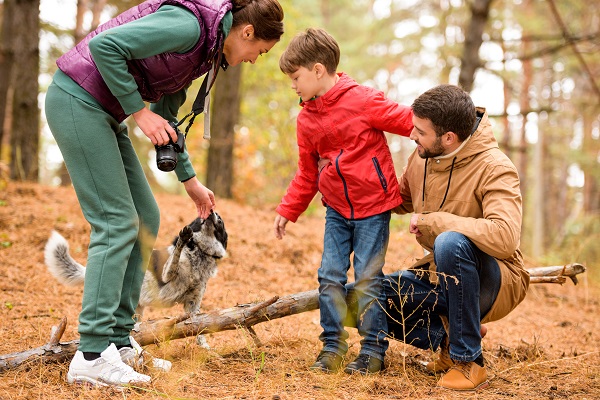It’s estimated that dogs bite around 4.7 million people every year, and nearly half of these victims are children between the ages of 5 and 9. Kids are too young to understand that dogs may be dangerous, so it’s up to parents to teach them how to behave around unfamiliar dogs. Protect your kids from dog bites by teaching them these tips:
Ask for permission.
Tell your children that they should never approach or touch an unknown dog before asking the owner for permission. If your child quickly reaches out and tries to pet a dog without asking for permission, the owner may not have time to warn him that the dog is aggressive.
Don’t escalate the situation.
Make sure your child knows how to avoid provoking a dog that already looks agitated. If your child encounters an aggressive-looking animal, be sure that he knows not to make any sudden movements. Children should also refrain from yelling, throwing something at the dog, or hitting the dog in an attempt to get him to go away. It’s best if the child remains completely still or slowly and quietly backs away from the animal if in this situation.
Look for warning signs.
Dogs may not be able to speak, but their body language can speak volumes. Dogs that are showing their teeth, growling, or snarling are preparing to attack. Other signs of aggression may not be so obvious. For example, dogs that are excessively yawning or licking their lips may also be tense and getting ready to attack. Look at the dog’s back to see if any of his fur is raised. The fur on the back and neck of a dog may begin to rise when he feels threatened, so this is another warning sign that your child should take seriously.
Don’t treat a dog like a toy.
Parents need to make it clear that dogs are living, breathing creatures and should not be treated like toys. If you don’t take the time to explain this to your kids, they may not understand that it’s not appropriate to tug on a dog’s tail or ears or to take a toy from his mouth.
Give him alone time.
Most dogs are friendly, but there are certain times that they want to be left alone. Tell your children to never bother a dog as he is eating or sleeping. Approaching a dog that is eating or sleeping may catch him off guard and cause him to attack.
Even if your child follows all of these tips, there’s a chance that a dog could still attack. If your child has been bitten by a dog, contact Reisch Law Firm today to learn how we can help you recover compensation. Schedule a free consultation today by calling 303-291-0555 or filling out this online form.


